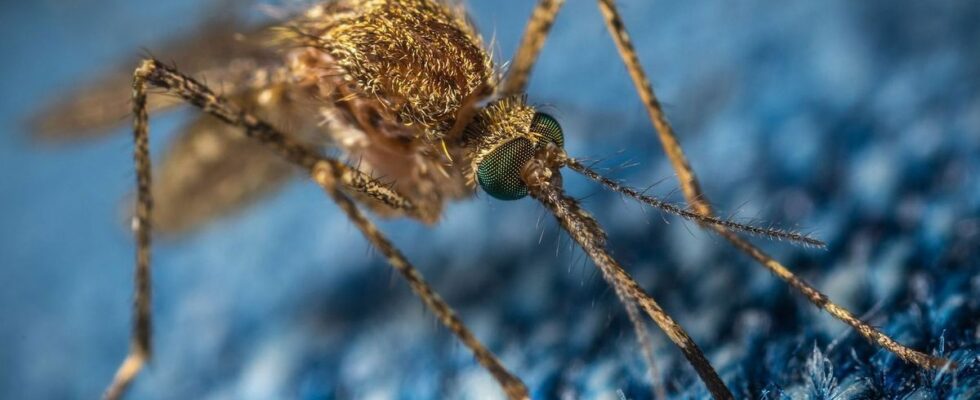Published on
Updated
Reading 3 min.
In the Paris region, the reinforced surveillance campaign for the tiger mosquito is in full swing, a few weeks before the opening of the Olympic Games, an event which, by encouraging the mixing of populations, could contribute to a resurgence of diseases such as dengue fever. .
On the outskirts of the Stade de France, located to the north of the French capital and where various Olympic events will take place such as athletics, one of the main disciplines, Kevin Meignan comes to take stock of a nesting trap installed a few years ago. weeks in a grass-lined driveway.
This bucket – potential spawning site – contains water and a square of polystyrene, which will support the spawning. It is covered with a metal grid to prevent the polystyrene from escaping out of the trap.
“The objective is to monitor the presence of the tiger mosquito“, explains to AFP the head of vector control for the Regional Mosquito Control Agency (ARD), operator of the Regional Health Agency (ARS) in the Paris region.
Since May 1 and until November 30, the main period of activity of this disease-carrying mosquito, health authorities will in fact scrutinize the presence of Aedes albopictus – its scientific name -, increase awareness messages and trigger possible mosquito control operations.
“During this time, we will come every month to remove the polystyrene contained in the trap to study it in the laboratory to find out if there are tiger mosquito eggs and, if there are, how many.“, continues Kevin Meignan.
Avoid larvae
By lifting the trap, it releases a biological product into the water.to avoid any potential development of larvae“.
Arriving in French France in 2004, the tiger mosquito has gradually established itself over a large part of metropolitan territory. As of January 1, it was present in 78 out of 96 departments.
Potentially vector of viruses such as dengue, chikungunya and Zika, it is particularly present throughout the Paris region.
In mid-April, health authorities warned of an unprecedented situation: a record number of imported cases of dengue fever – nearly 1,700 – recorded in mainland France since the start of 2024. Since then, the record reached for the whole of 2023 (2,019) has been beaten.
These imported cases concern people who have traveled to regions of the world where this virus circulates endemically: the French West Indies and more widely this year Latin America and the Caribbean.
As “the significant number of imported cases could lead to the establishment in France of indigenous chains of transmission“, the Director General of Health Grégory Emery called for the greatest vigilance.
An “indigenous case” means that the person did not travel to areas where the virus is widely circulating but was bitten by a mosquito that became infected through contact with an infected traveler.
More than 500 traps
Prevention messages will be “all the more important as in the next few weeks France will host“the Olympic and Paralympic Games, during which”many travelers will come to the metropolitan area“, recalled the Director General of Health.
In anticipation, the monitoring system is, this year, “reinforced“, assures the Regional Health Agency of the Paris region.
Awareness and prevention information for travelers departing from or arriving in endemic areas will be disseminated in particular at airports.
More than 500 nesting traps will be positioned throughout the region. “This year, we favored places for large gatherings“, underlines Cécile Somarriba, director of monitoring and health security at the ARS.
These traps will be deployed around the Stade de France, the Olympic village, or even certain “fan zones”.
“In recent years, the population of tiger mosquitoes has completely exploded throughout Ile-de-France (the Paris region, editor’s note). So obviously, the health risk increases“, warns Kevin Meignan.
The ARS also encourages individuals to remove stagnant water, potential breeding grounds, inside and around their homes.
“There are simple actions that can reduce the number of tiger mosquitoes“, assures Cécile Somarriba, while recognizing that this is a “major issue” for the Ile-de-France region.
